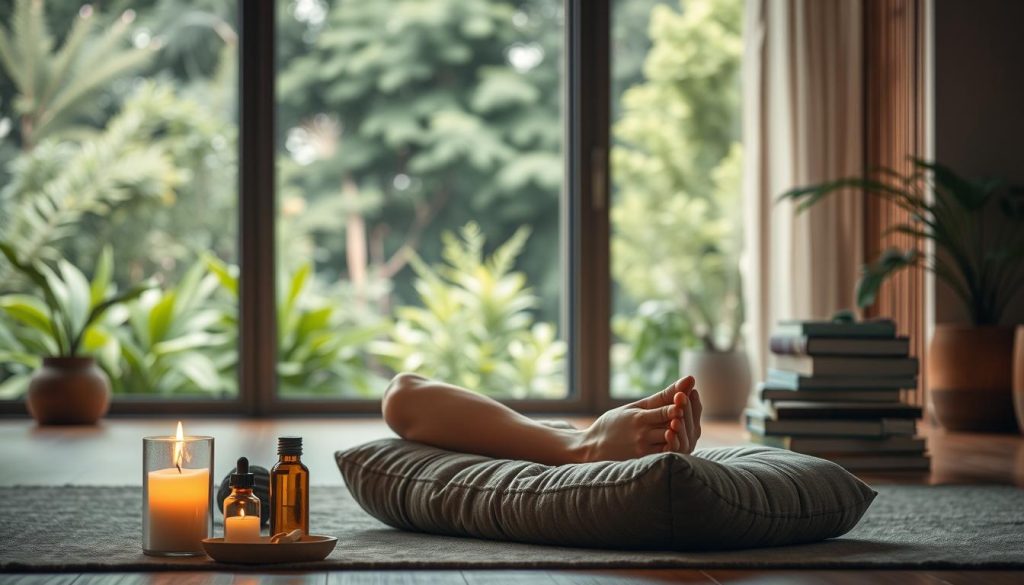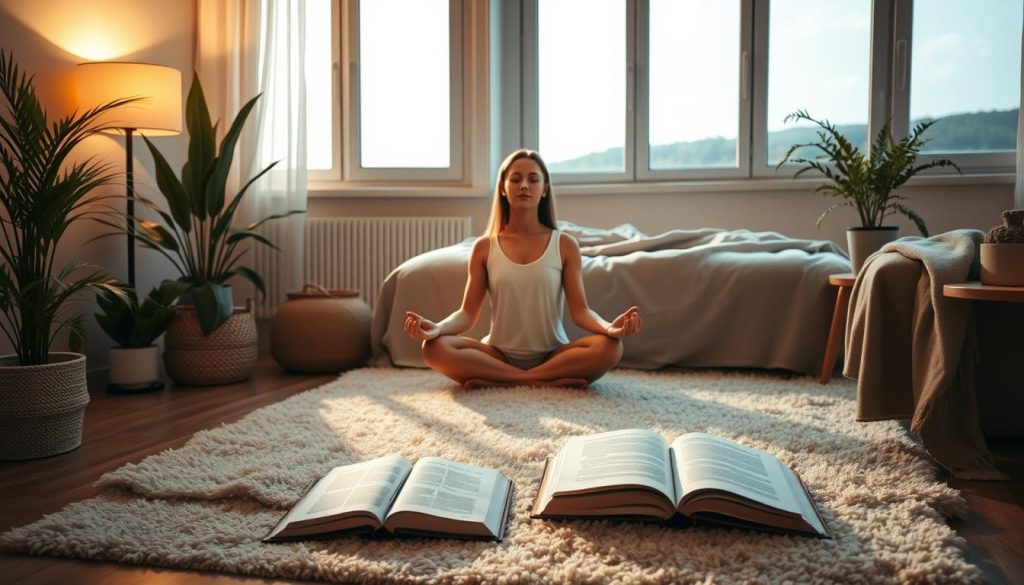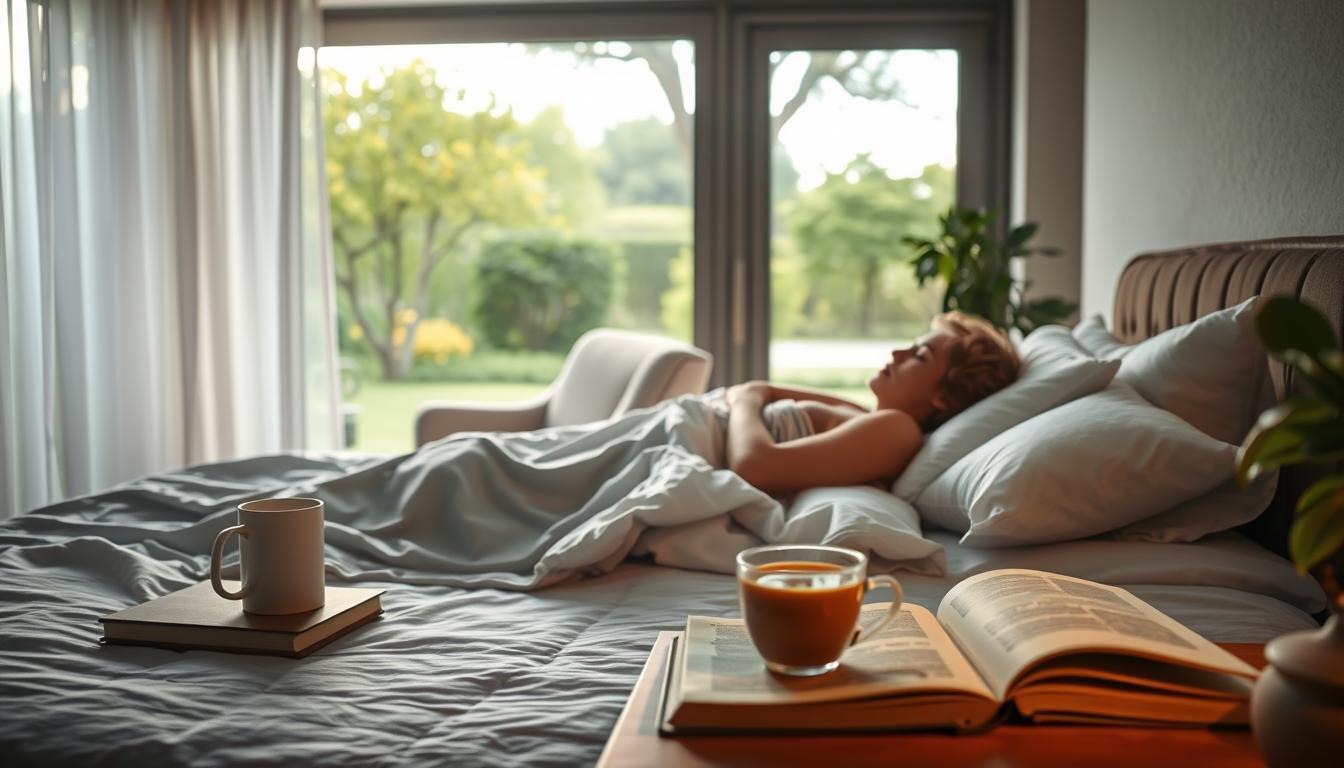Learning to manage anxiety and sleep cycles is key for good mental health. Anxiety can mess up your sleep, causing problems like insomnia or waking up a lot. Using stress relief strategies can help lessen anxiety’s effects and improve your sleep.
This article will share techniques and tips to boost your mental well-being and get a better night’s sleep.
Understanding the Connection Between Anxiety and Sleep Cycles
Anxiety and sleep are closely linked, forming a cycle where one affects the other. Anxiety can disrupt sleep, leading to poor sleep quality. This makes managing anxiety key for better sleep and overall health.
Studies reveal that high anxiety triggers the body’s stress response. This releases cortisol, making it hard to sleep. As a result, sleep becomes broken, reducing its restorative effects. Poor sleep also weakens the brain’s emotional control, often increasing anxiety the next day.
Common Symptoms of Anxiety-Induced Sleep Issues
Anxiety can really mess with your sleep, leading to many sleep problems. We’ll look at how anxiety can cause insomnia, nightmares, and waking up a lot.
Insomnia
Insomnia is a big problem for people with anxiety. It’s hard to fall asleep or stay asleep. Nighttime anxiety makes your mind race and your heart beat fast, making it hard to relax.
This can lead to poor sleep and feeling tired all day.
Nightmares
Nightmares are another big issue for those with anxiety. Anxiety can mess with the brain’s ability to control emotions while sleeping. This leads to scary dreams.
These nightmares can make it hard to sleep well, leaving you feeling tired and anxious.
Frequent Waking
Waking up a lot during the night is common with anxiety. It’s because you’re more sensitive to noise, light, or worries. This can break your sleep and make anxiety and insomnia worse.
Methods to Reduce Anxiety for Better Sleep
Managing anxiety before bed is crucial for a good night’s sleep. By using relaxation techniques and stress relief, you can sleep better. This leads to more restful nights.
Mindfulness Practices
Mindfulness focuses on the present moment without judgment. It includes guided meditation and body scans. These practices reduce stress and anxiety, helping you sleep better.
Breathing Exercises
Breathing exercises are simple yet effective for stress relief. Deep breathing triggers the body’s relaxation response. This prepares you for sleep. The 4-7-8 method is a great example, promoting deep, slow breathing.

Aromatherapy
Aromatherapy uses essential oils for health benefits. Oils like lavender, chamomile, and bergamot help reduce stress and improve sleep. Using these oils before bed can create a calming atmosphere for better sleep.
Creating an Optimal Sleep Environment
Turning your bedroom into a calm space is key for good sleep and stress relief. We’ll look at how room darkness, quiet, comfy bedding, and the right temperature can improve sleep.
Dark and Quiet Room
A dark and quiet room is essential for sleep. Less light helps your body know it’s time to sleep. Use blackout curtains and cover up any devices that light up.
Earplugs or white noise machines can also help block out loud noises. This can help you relax and sleep better.
Comfortable Bedding
Having the right bedding is crucial for sleep. Good mattresses and pillows can make a big difference. Look for materials that keep you cool and support your body well.
Choose soft, breathable linens that feel good against your skin. This can help you sleep better and feel less stressed.
Temperature Control
Keeping your room at the right temperature is important too. Most people prefer a room temperature between 60-67°F (15.5-19.5°C). A cooler room helps your body cool down naturally while you sleep.
Use thermostats, fans, or climate control to keep your room at the perfect temperature. This can help you sleep better and feel less stressed.
Role of Diet and Exercise in Managing Anxiety and Sleep
Diet and exercise work together to manage anxiety and improve sleep. Eating right and staying active can help fight anxiety and make sleep better. We’ll look at how good foods and regular workouts are key in this fight.
Nutrition Tips
Diet affects anxiety and sleep a lot. Eating foods like cherries, almonds, and oatmeal can help sleep better. Omega-3s in fish like salmon reduce anxiety by fighting inflammation and stabilizing mood.
Also, eating whole grains, fruits, and veggies is good for your mind. It’s part of natural ways to handle anxiety.
Exercise Routines
Exercise is vital for managing anxiety and getting good sleep. Activities like yoga, walking, and aerobics raise endorphins, easing anxiety. Having a routine of morning or evening workouts can also improve sleep.
Plus, moderate exercise boosts serotonin, helping control sleep cycles.
In short, paying attention to diet and exercise can greatly help with anxiety and sleep. Eating right and staying active are natural ways to feel better overall.
Natural Remedies for Anxiety: Pros and Cons
Looking into natural remedies for anxiety can help manage symptoms and improve sleep. These methods include herbal supplements, aromatherapy oils, and over-the-counter options. Each has benefits and possible side effects. Let’s explore their pros and cons to find the best sleep aids for you.
Herbal Supplements
Herbal supplements like valerian root, passionflower, and chamomile are popular for anxiety. Valerian root is known for its sedative effects. Chamomile is loved for its calming properties.
| Supplement | Pros | Cons |
|---|---|---|
| Valerian Root | Helps with sleep, reduces anxiety | May cause dizziness, headaches |
| Chamomile | Reduces anxiety, promotes relaxation | Possible allergic reactions |
| Passionflower | Calms nervous system, improves sleep | Some individuals may experience drowsiness |
Aromatherapy Oils
Aromatherapy oils like lavender, bergamot, and frankincense are used for anxiety. They can be diffused, applied topically, or added to bath water. This helps relax and promotes sleep.

Each oil has special benefits. Lavender calms, bergamot boosts mood, and frankincense reduces stress.
Over-the-Counter Options
Options like melatonin supplements and certain magnesium can help with sleep. Melatonin helps regulate sleep cycles, especially for those with anxiety-related sleep issues.
| Option | Pros | Cons |
|---|---|---|
| Melatonin | Regulates sleep cycles, easy to find | May cause grogginess |
| Magnesium | Relaxes muscles, improves sleep quality | Potential digestive issues |
Both methods can improve sleep quality. But, it’s key to think about side effects and talk to a healthcare provider. This helps choose the right remedy for you.
Importance of Sleep Hygiene
Good sleep habits start with sleep hygiene practices. These practices help the body and mind get ready for sleep. They make sleep better and help with anxiety and stress.
Keeping a regular sleep schedule is key. Going to bed and waking up at the same time every day is important. It helps your body’s clock work better, making sleep easier and waking up feeling good.
Having a calming bedtime routine is also important. Reading, taking a warm bath, or relaxing can tell your body it’s time to sleep. Stay away from caffeine and screens before bed to help you sleep better.
The place where you sleep matters too. A comfy mattress, cool room, and quiet space are best for sleep. Adding these habits to your life can greatly improve your sleep and health, reducing anxiety.
How Mindfulness Can Help Improve Sleep Quality
Adding mindfulness to your bedtime routine can really boost your sleep. Mindfulness practices like meditation and guided imagery help a lot. They are great for reducing stress and making you feel more relaxed.
Meditation Techniques
Meditation before bed can do a lot of good. It calms your mind and gets your body ready for sleep. Focused breathing and body scan meditations are especially good for relaxing and lowering stress.
Guided Imagery
Guided imagery is another way to improve sleep. It involves imagining peaceful scenes or scenarios. This helps take your mind off worries and makes it easier to fall asleep.
Using mindfulness, like meditation and guided imagery, can greatly improve your sleep. Regular practice brings big benefits. It helps you relax and feel less stressed.
Relaxation Techniques to Alleviate Anxiety
Learning relaxation techniques is key to beating anxiety and improving your sleep. Adding these practices to your bedtime routine helps you relax and sleep better. It makes your nights more restful and refreshing.
Progressive Muscle Relaxation
Progressive Muscle Relaxation (PMR) is a great way to lower stress and body tension. It involves tensing and then relaxing different muscle groups. By focusing on each muscle, from toes to head, you release anxiety.
Doing PMR regularly can greatly improve your sleep quality.
Journaling Before Bed
Writing in a journal before bed is a good way to clear your mind. It helps you deal with thoughts and feelings that cause anxiety. By putting your worries on paper, you calm your mind.
This also stops you from getting restless at night. It makes it easier to fall asleep and stay asleep.

Effective Strategies for Improving Sleep Patterns
Improving your sleep can greatly boost your health and reduce anxiety. Two key strategies are keeping a regular sleep schedule and cutting down on screen time before bed. These steps help ensure you get quality sleep.
Consistent Sleep Schedule
Going to bed and waking up at the same time every day is key. This helps your body get into a rhythm for better sleep. Try to relax before bed with activities like reading, a warm bath, or mindfulness exercises.
Limiting Screen Time
Try to avoid screens for at least an hour before bed. Blue light from devices can mess with your sleep hormone, melatonin. Instead, listen to calming music or meditate to relax. These habits can improve your sleep quality and reduce anxiety.
Cognitive Behavioral Therapy (CBT) for Anxiety and Insomnia
Cognitive Behavioral Therapy, or CBT, is known for helping with anxiety and insomnia. It helps change negative thoughts and behaviors that mess with sleep and make anxiety worse. By fixing these psychological issues, CBT improves sleep quality, making it more restful and refreshing.
The main aim of CBT is to change negative thought patterns that lead to anxiety and insomnia. Patients learn to spot and question these distorted views about sleep and anxiety. This is key in fixing sleep problems for the long term.
CBT also teaches better sleep habits and hygiene. It uses methods like stimulus control, sleep restriction, and relaxation training. These methods help reduce anxiety and improve sleep.
In the field of behavioral sleep medicine, CBT is a complete solution. It tackles sleep problems right away and gives people tools to handle anxiety better. This two-way approach leads to lasting improvements in both anxiety and sleep.
When to Seek Professional Help for Anxiety and Sleep Issues
Knowing when to get help for anxiety and sleep problems is key to staying healthy. If sleep issues are really affecting your life, like making it hard to work or socialize, it’s time to seek help. Symptoms like long-lasting insomnia, scary dreams, or anxiety that won’t go away also mean you need professional care.
Looking for mental health resources can help you tackle these problems. Begin by talking to your doctor, who can send you to a sleep expert or a mental health professional. Treatments like cognitive behavioral therapy, medication, and lifestyle advice can really help.
It’s vital to act fast when dealing with anxiety and sleep issues. Getting help early can greatly improve your life quality. Use trusted mental health resources to find the best treatments for you.

